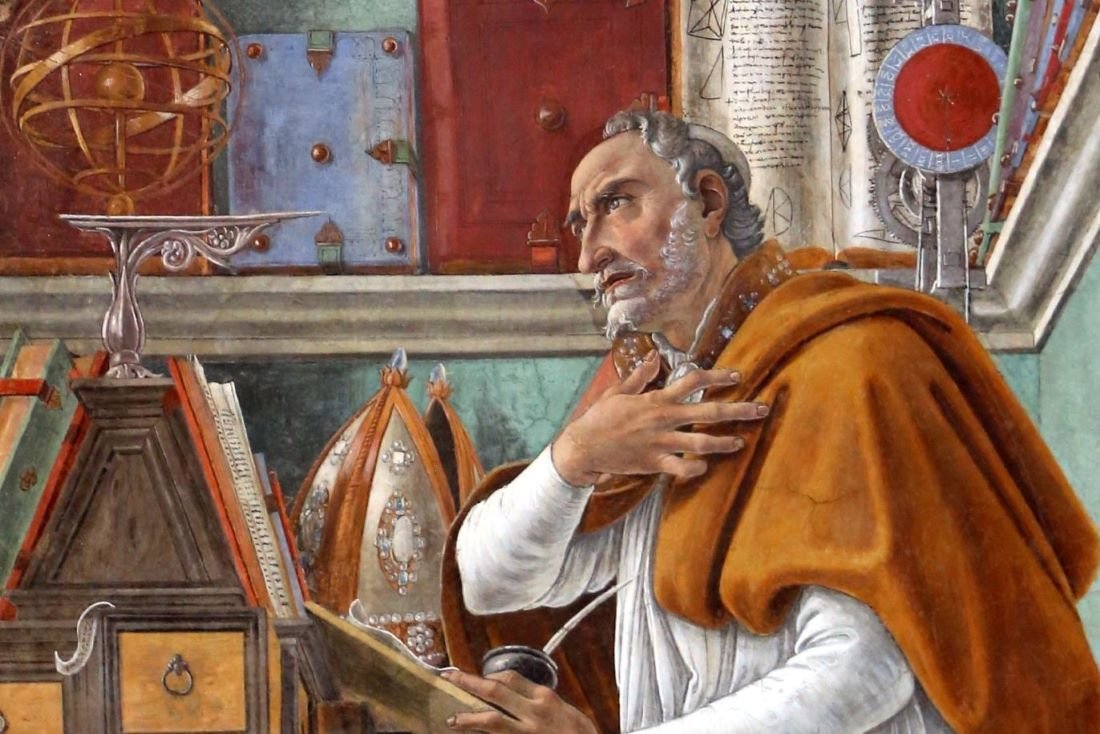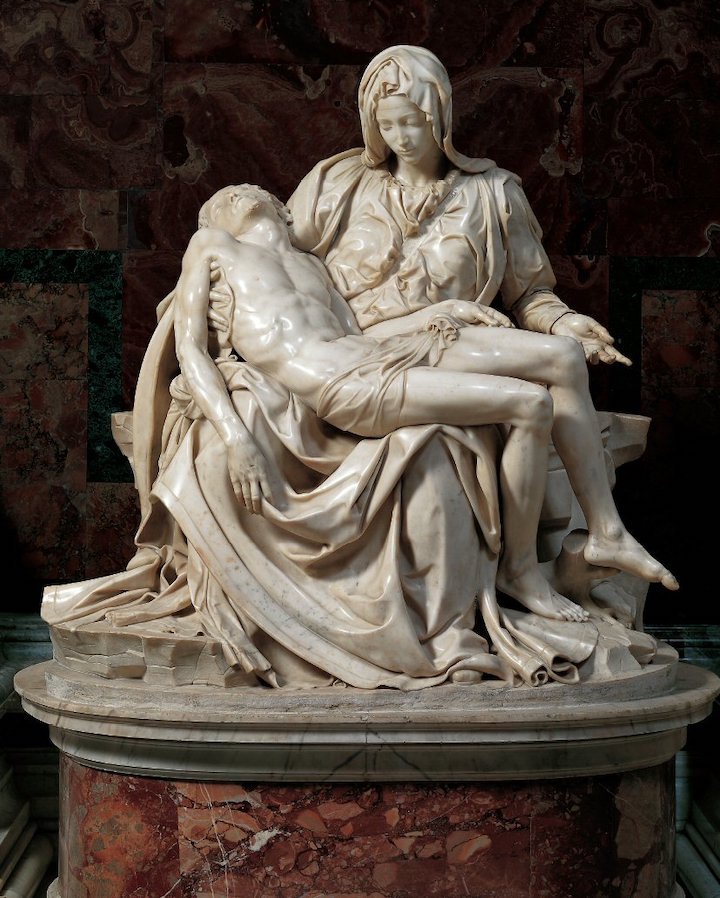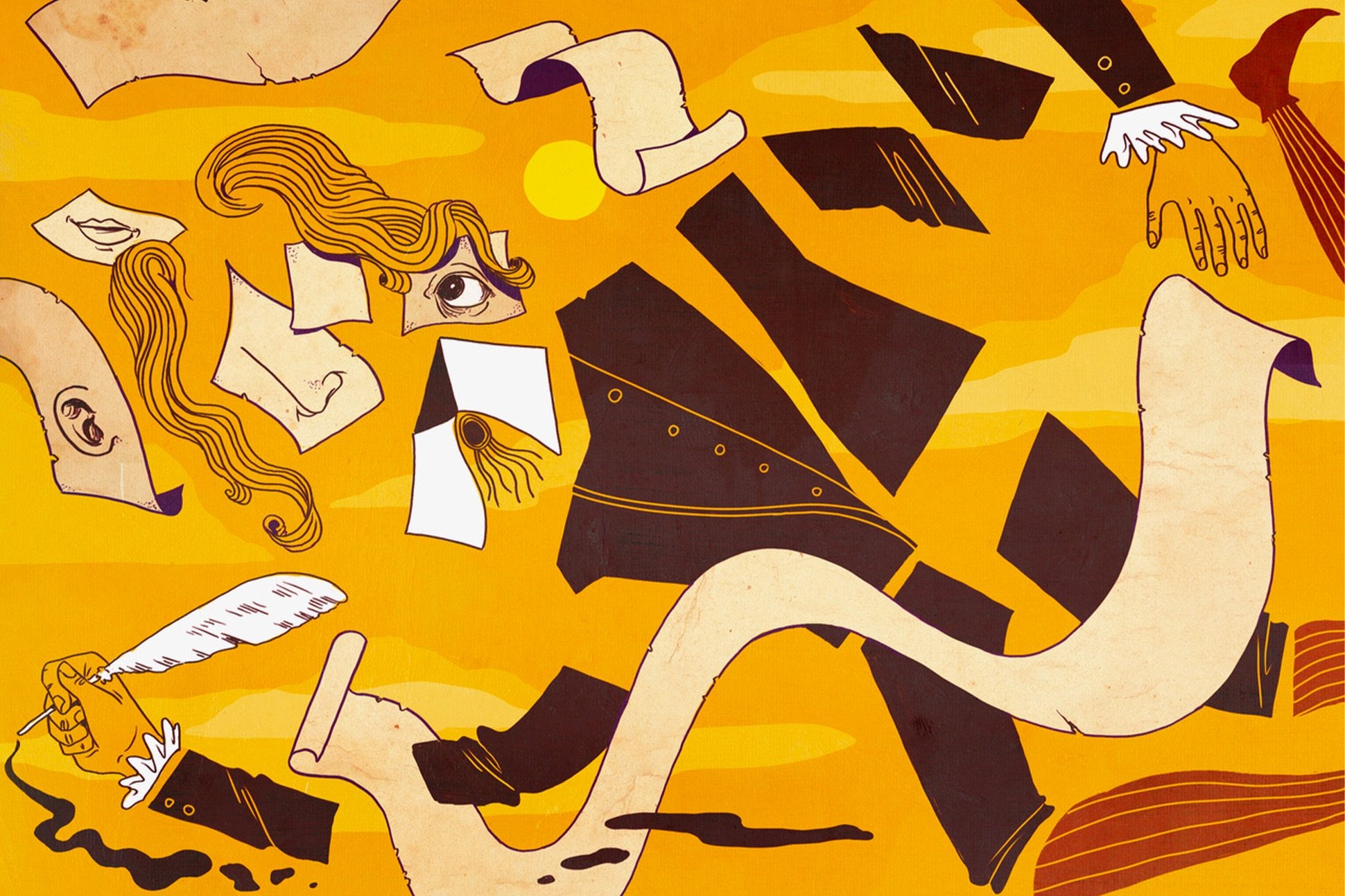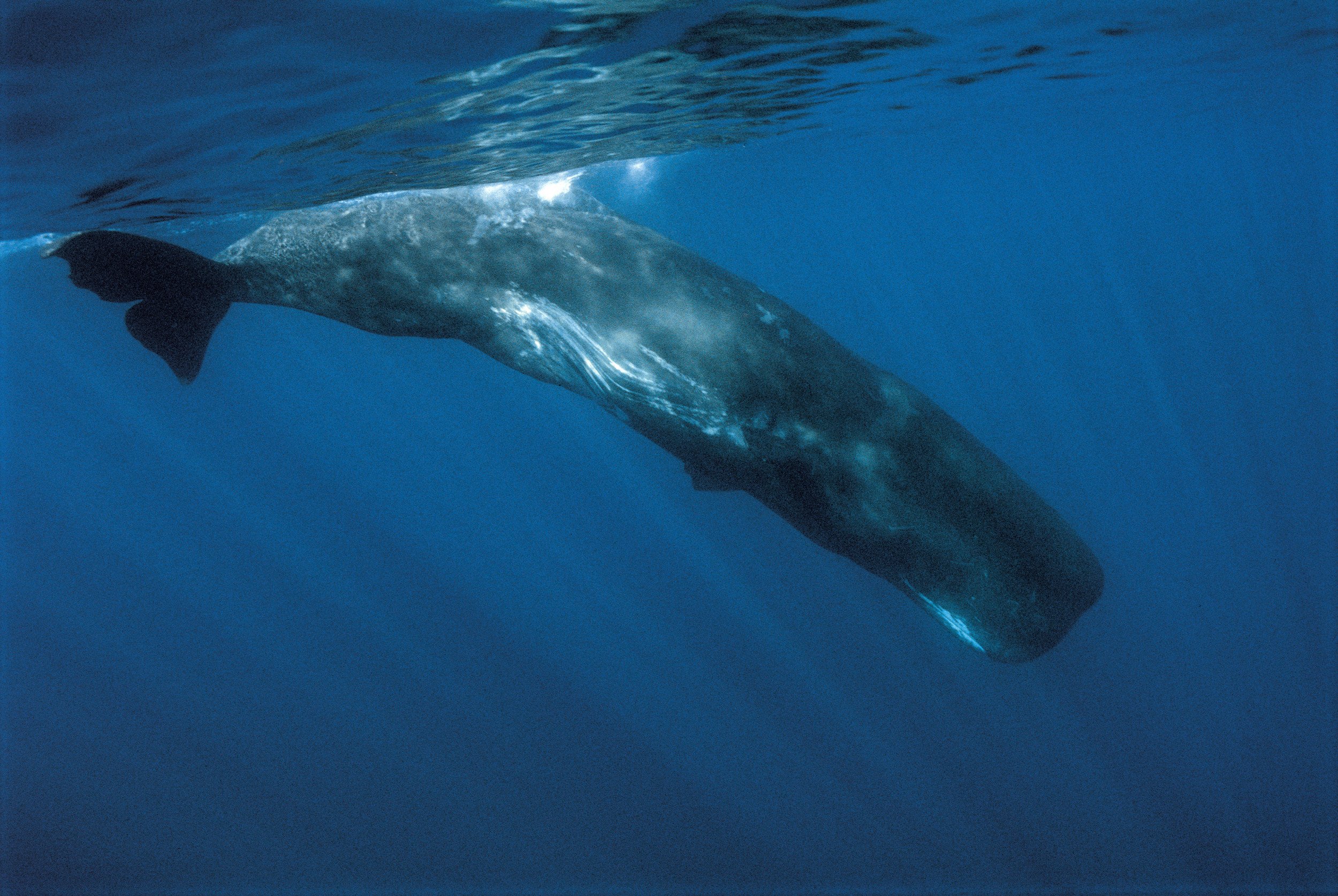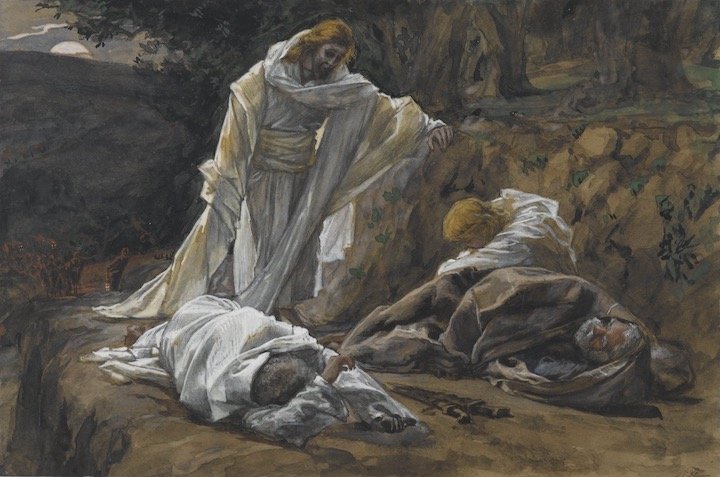Published in the March Magnificat [LES]
The Poetry of Praise
The Terrible Irony of Sin
Anthony Esolen
“Ye shall be as gods,” says the serpent, that liar from the beginning, and Eve believed him. His lie was no simple utterance of an untruth. For Adam and Eve already were as gods. When God blessed them, he did so in the same terms he used to bless the birds of the air and the fish of the sea, but he added another, befitting their having been made in his image: they were to have dominion. Adam exercised this godlike authority when he named the beasts, just as God himself had named day and night, heaven and earth. The very nakedness was not childish but divine—free, open, without disguise. But the serpent said that God was sly and weak and envious, a God who does not say what he means.
And man believed it, and has been a creature of concealment ever since.
Mountains, fall on us
We say that we wish God would show himself openly to us, and speak clearly, and then we would believe and obey. We say it while we roll balls of wax to plug up our ears. The last thing the Jews could say was that God had not spoken clearly. He spoke through the Law and the prophets, and though in the latter we find many sayings that mean far more than the Jews of the time could imagine, they surely did not mean less. Yet man does not listen. He begs the mountains to fall upon him, to hide him not only from the wrath of God, but from his love. But God is love, and seeks us out, whether we like it or not, and mostly we do not like it.
Jerusalem, Jerusalem, cried Jesus, you who kill the prophets and stone those sent to you, how many times I yearned to gather your children together, as a hen gathers her young under her wings, but you were unwilling (Mt 23:37).
That is why we put Jesus to death.
But the story of man does not end in sin. That God who summoned light out of darkness can bring forth good from evil, not because evil is necessary or because it harbors some secret good within, but because God, who created time, and to whom all time is less than the twinkling of an eye, dashes to pieces our plans for death, and turns the engines of our sin against sin itself.
The Reproaches
We see as much in the grave and bitterly ironic prayer for the ancient liturgy of Good Friday, the Improperia—the Reproaches. Imagine you are going up to venerate the cross, and you hear, from the loft above, such words as these (I have translated from the Latin of the old Roman Gradual) sung out by a pair of cantors:
My people, what have I done to you? How have I offended you? Answer me. I led you from the land of Egypt, but you prepared a cross for your Savior.
Then, phrase by phrase, two choirs sing alternately, the first in Greek, the second in Latin, Holy is God, holy and mighty, immortal God, have mercy on us.
That response, in which we pray in our own persons, is essential. Otherwise we would end in accusation, to which there is no answer. But the very reproach has become a promise, as we must feel as we behold the holy cross and show, abashed, our gratitude and love. For we have been led by that cross from a captor more slavish than any the children of Israel suffered.
The Reproaches continue, and grow ever more acutely ironic. In our current Roman liturgy, we use three of them, but there were another nine also, and the twelve were to be chanted all or in part, according to the number of the congregants. The second echoes the first, and continues the story of liberation from Egypt:
I led you forty years through the desert, and fed you with manna, and brought you into a good and rich land: but you prepared a cross for your Savior.
After which the choirs respond again, as above. We cannot help but think of the Eucharist, the great sacrament of love that Jesus instituted the very night before we handed him over to death: manna, in the shadow of the cross.
The third reproach brings us into Canaan, and echoes the words of God to Isaiah, for he chose a rich hill for his vineyard, and he cleared the land, and planted the sweet vines, and thought to get grapes from it, but instead he got the wild and worthless stuff; what is to the wine grape as the crab is to the apple. What more could be done for my vineyard that I did not do? asks the Lord (Is 5:4). God would give us wine, and we give him gall:
What more should I have done for you, that I did not do? For I planted you, my loveliest vine: but you have become most bitter to me, for when I was thirsty you gave me vinegar to drink: and with a spear you pierced the side of your Savior.
And the choirs respond as above, a third time.
Things and deeds, not ideas
After this, the Reproaches used to continue, nine more, without the Latin and Greek antiphons. Each reproach, however, would be introduced as the first one was, with the question of Christ: My people, what have I done to you? How have I offended you? Answer me. Of course there is no answer. There cannot be. God gives us existence itself at every moment of our lives, and how do we repay him? Not even with gratitude, most of the time—the easiest recompense.
What I find most powerful about these prayers is that they are unabashedly particular: God works his saving will by means of real creatures, real events, particular persons: by the manna and the quail, the dividing of the sea, the staff of Aaron; and these come to their full meaning in the deeds and the person of Jesus Christ:
For your sake I scourged Egypt and her firstborn sons: and you handed me over to be scourged.
I led you out of Egypt, and drowned Pharaoh in the Red Sea: and you handed me over to the chief priests.
I opened the sea before you: and with a lance you opened my side.
I went before you in a pillar of fire: and you led me to the praetorium of Pilate.
I fed you with manna in the desert: and you gave me up to buffets and scourges.
I gave you to drink of saving water from the rock: and you gave me to drink vinegar and gall.
For your sake I struck the kings of the Canaanites: and you with a reed struck my head.
I gave you a royal scepter: and for my head you gave a crown of thorns.
I lifted you up in great power: and you hung me on the gibbet of the cross.
What can we say? The facts confront us to our shame and to the glory of God, and yet, if we will but accept the saving work of Christ crucified, that same sign of treachery and violence, that sign of judgment against the judges of Christ, becomes the Tree of Life. Everything in the universe, every word spoken or deed done, is a work of grace to those who will receive it, for we know that all things work for good for those who love God (Rom 8:28).
Keep near the tree
We are apt to think that when Jesus says we must take up our cross and follow him, it is only a suffering to be borne, and not also a privilege, an invitation. The world sees a man hanging on a cross, and, at its most sympathetic, utters a couple of platitudes about what happens when you dare to question the political and religious authorities; and people suppose they will be brave likewise, and do what Jesus did. Pride, pride, wearisome and full of deceit! We Christians believe instead that the cross has become our joy, not because of what we did or what we promise to do, but because of what God has done.
Think of it: we planted that dead trunk in a hole in the ground atop Golgotha, intending bitterness, and instead we get the wine of life and the water of salvation, coming from the riven side of the Lord. Therefore we sing out with the choirs, after the Reproaches are done:
We adore thy cross, O Lord, and we praise and glorify thy holy Resurrection: for behold, by wood has come joy unto all the world. May God have mercy on us, and bless us, and make his face to shine upon us, and have mercy on us. We adore thy cross, O Lord, and we praise and glorify thy holy Resurrection: for behold, by wood has come joy unto all the world.
It is a stately and solemn chant, until we get to the Latin venit—“has come”—and then suddenly we sing eight notes on that little word, as the music rises in joy.
Can there be more? From the inexhaustible fount of God’s love, there is always more, even in the darkness of Good Friday. After that chant, you would sing the ancient hymn Crux fidelis: Faithful Cross, whose wood is sweet, whose nails are sweet, which bore the sweet burden of the body of Christ. We may sin, but he is faithful, and the cross is the tree whose leaves will be for the healing of the nations, fresh and green for all eternity. Let us gather in its shade—and its light.





